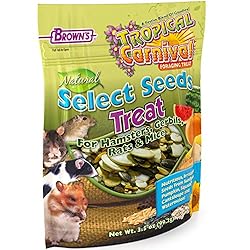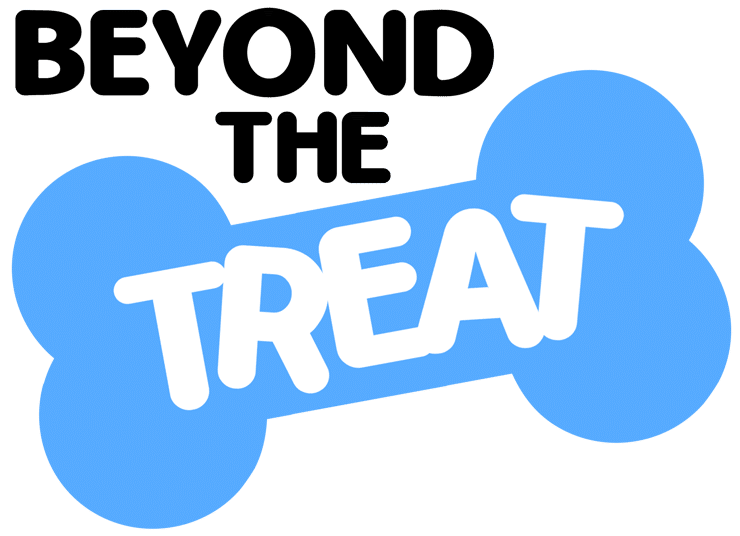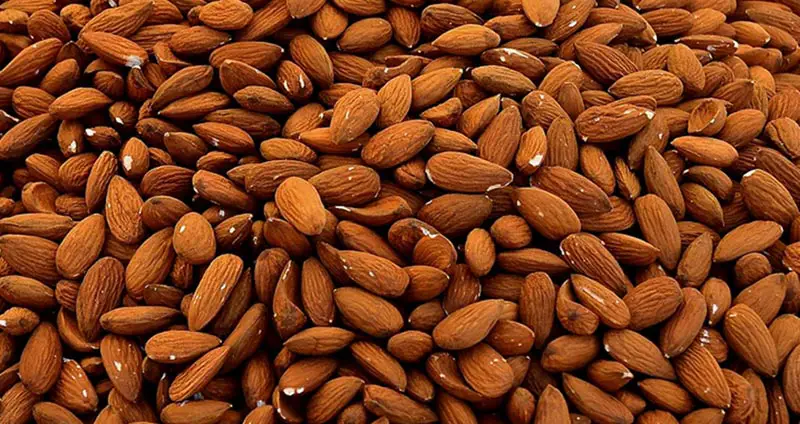Almonds are commonly praised for just how healthy they are as a snack food. These tree nuts are loaded with healthy fats, antioxidants, manganese, magnesium, and vitamin E. They’re also just ridiculously good-tasting! With all of the benefits that come from almonds, you may be wondering: Can hamsters eat almonds?
Yes, hamsters can eat almonds in small amounts. Hamsters absolutely love the taste and texture of almonds, and they’re the perfect size for an occasional little treat. If you do opt to feed your hamster almonds, though, you need to do so properly and with several things in mind.
Table of Contents
What Do Hamsters Eat In The Wild?
In order to understand whether or not almonds are healthy for hamsters, it helps to know what they naturally eat in the wild. For thousands of years, hamsters have been roaming free throughout Romania, Belgium, Syria, China, and Greece. Throughout this period of time, these hamsters have eaten roughly the same foods. This has resulted in their digestive systems becoming optimized for the processing of those specific foods that they frequently encounter.
Therefore, it’s very important that you match your hamster’s diet to the diet of a wild hamster — their bodies are specifically designed for certain foods!
While hamsters are classified as omnivores, they have a diet that very closely resembles that of a standard herbivore. This characteristic means that hamsters are able to eat a wide variety of different foods in order to get their essential nutrients. Because of this, you’ll see a wild hamster’s diet largely consisting of grains, seeds, nuts, and the occasional fruit and vegetable.
Hamsters eat in a way that can be defined as scavenging. That is, they run around in search of food and eat/store basically anything that they come across. The specific food that a hamster eats depends on the time of year and their geographical location, but all hamsters eat roughly the same foods. The most common foods in a hamster’s diet are grains, nuts, seeds, vegetables, fruits, cracked corn, frogs, lizards, and various insects.
Health Benefits & Dangers Of Almonds
Upon looking at the diet of a wild hamster, it doesn’t seem as if almonds would be out of place in their diet. Hamsters may not have access to almonds specifically in the wild, but they do occasionally eat seeds and nuts that are similar in nature. Therefore, there isn’t too much to consider when feeding your hamster almonds.
There are only two things you should be aware of when it comes to almonds. First of all, they’re quiet a filling tree nut! In fact, humans commonly eat almonds to aid in weight loss as they help you feel more full. While this is a great trait, it can be a bit harmful for hamsters. If a hamster were to eat too many almonds, they may not have the desire to eat their specialized hamster food. Almonds are nutritious, but not nearly nutritious enough to make up a good portion of a hamster’s diet. Therefore, you need to keep serving sizes in check.
Additionally, make sure that you’re feeding your hamster the right kind of almond. The standard almond that you purchase at a store is totally safe, but you need to avoid bitter almonds. Raw bitter almonds contain hydrogen cyanide, which is extremely fatal when eaten by hamsters. Fortunately, the sale of these almonds is prohibited in the United States, so you shouldn’t have to worry about them.
The above issues are quite insignificant and very easy to deal with, so it’s safe to say that almonds are quite a nice hamster snack. When fed properly, almonds should bring your hamster nothing but benefits.
How To Properly Feed Your Hamster Almonds
The only way that almonds will cause problems in your hamster is if they’re eaten too frequently. Eating too many almonds can result in malnutrition, which is something that you want to avoid in your hamster at all costs. So, if you want to feed your hamster almonds, you must do so in a careful and appropriate way.
In terms of serving sizes, an almond given every other day is generally a safe amount. Some hamster owners will opt to feed their hamsters an almond every day, and this is also quite a safe amount. However, it’s always better to be safe than sorry and slowly work up to higher serving sizes.
If you’re set on feeding your hamster almonds as a snack, you first need to ensure that their nutritional needs are being met. Sure, almonds make for a great snack for hamsters, but they shouldn’t be treated as anything more than that. It simply doesn’t have the nutritional content necessary to act as a staple food in the diet of a hamster. Therefore, they need to get their essential nutrients from other foods.
All hamsters need to have a high-quality pellet or mixed food as their primary food. These pellets and mixes are specially-formulated for hamsters so that they can provide them with their essential nutrients. In addition to their great nutritional content, these foods taste great and are very healthy for hamsters to chew on.
Ways Hamsters Can Eat Almonds
With the popularity of almonds, it makes sense that people have discovered many different ways to enjoy them. If you want to really spice up your hamster’s diet, you can give some of those methods a shot! Below are some of the most common ways that almonds are eaten.
- Raw almonds – This is how almonds are normally eaten! They have a great texture, taste great, and are very healthy (despite their high-caloric content). Giving your hamster a raw almond is a very easy snack that they’re sure to love. Just make sure that they’re not too heavily-salted.
- Roasted almonds – Roasted almonds are simple almonds that have been placed in an oven for a short amount of time! This makes for a crunchier, arguably tastier nut that hamsters will also love. Sometimes roasted almonds are made with olive oil or cinnamon, but these additives should be avoided.
- Flavored almonds – Many people love flavored almonds, as they provide a unique spin on a favorite traditional snack. In general, flavored almonds shouldn’t be dangerous to hamsters, but they shouldn’t necessarily be fed. Flavored almonds will tend to be higher in sugar and sodium which can be unhealthy for hamsters. Plus, hamsters won’t mind eating normal almonds — don’t worry about making them fancy!
- Almond butter – Almond butter is commonly seen as a healthier alternative to peanut butter, and in many ways it is! A tiny bit of almond butter given to a hamster will generally be fine, but it shouldn’t be a regular occurance. The consistency of almond butter may be difficult for hamsters to handle and could potentially cause choking. If you do want to give your hamster a bit of almond butter, make sure that nothing was added to it — just pure almond.
Good Almond Alternatives For Hamsters
While almonds are great hamster snacks, they shouldn’t be the only thing that you feed to your hamster besides their daily food. If you want to further diversify your hamster’s diet, there are some great alternative treats available. Below are two of our favorite hamster treats in terms of taste and nutritional content.
OUR RECOMMENDATION
Supreme Tiny Friends Farm Lovelies Treats
These are some of the most popular hamster treats available, and it’s quite clear why that is.
They’re made from only a handful of natural ingredients that perfectly work together.
2-3 of these treats per week is enough to keep your hamster’s diet interesting and quite well-rounded.
OUR RECOMMENDATION
Brown’s Tropical Carnival Natural Select
A good alternative to a standard hamster treat is a high-quality seed mixture, and this is a great one.
There are plenty of quality, healthy seeds in this mixture such as pumpkin and sunflower.
A couple of seeds per day is an excellent way to round out a hamster’s diet and promote good dental health.



